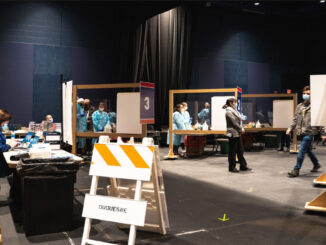Katia Faroun | Associate Photo Editor
04/08/2020
50 years ago, Houston had a problem.
On April 11, 1970, NASA launched the Apollo 13 mission to the moon. The goal of the seventh Apollo mission was to explore different lunar sites to gather more knowledge about Earth’s moon. However, 55 hours and 55 minutes into the mission, an oxygen tank in the Service Module failed and the mission was aborted. Instead of landing on the surface of the moon, astronauts Jim Lovell, Fred Haise and Jack Swigert took shelter in the Lunar Module as the spacecraft looped around the moon and landed safely in the Pacific Ocean four days later.
Despite the mission’s failure, the situation gained international attention and rejuvenated American interest in space exploration. The efforts made by both crews — on Earth and in space — to cooperate and improvise a solution marked the mission as one of NASA’s most defining moments.
This Saturday marks the mission’s 50th anniversary, and to celebrate, a NASA data visualization software engineer crafted a website that takes users on a “real-time journey through the Apollo 13 mission.” Apollo 13 in Real Time allows users to experience the Apollo 13 mission as it happened, with access to images, space-to-ground audio, press conferences and 7,200 hours of Mission Control audio, directly from the archives. Users can follow along with the audio and visuals, experiencing everything from the mission come together exactly 50 years later.
“This allows you to somewhat witness the events happening as they happened, as though you could open a window into history and step through it and actually be a fly on the wall 50 years ago,” said Ben Feist, the creator of the website.
Despite the historical significance of the event, the occasion has yet to receive a fair amount of recognition. As the nation battles the growing COVID-19 outbreak, media coverage has focused on little other than the pandemic’s impact on the country. Besides the occasional 2020 election update, headlines are occupied with the day’s new case count and the latest information from the daily White House coronavirus briefings.
Feist and his team started the project with the goal to reanimate history, months before the first COVID-19 outbreak in Wuhan, China. While the goal of the project remains the same, Feist worries that the anniversary will be buried under constant coverage of the virus.
“We’re now faced with the possibility that people won’t be focused on this work,” Feist said. “It represents person years of effort, and it would be a shame if the anniversary went by without anybody noticing.”
After the explosion of the first oxygen tank, the Apollo 13 crews had to communicate under extreme time pressure to try and find alternative solutions. An hour later, the mission was aborted, and all efforts were focused on safely returning the astronauts back to Earth. The explosion triggered a rapid loss of oxygen and fuel, cutting off the electricity in the Command Module and forcing Lovell, Swigert and Haise into the Lunar Module, which was designed to support only two men for 45 hours. Ground crews in Houston improvised, formulating and testing new procedures to keep the astronauts alive. Despite food and water shortages, low temperatures and a dangerous buildup of carbon dioxide, ground crews returned the astronauts to Earth 142 hours into the mission.
Feist continues to be inspired by the work of the astronauts and ground crews during the so-called “successful failure” of the Apollo 13 mission. The average age of those in Mission Control was just 26 years old, and many had limited experience working with space flight.
“It’s not just people being incredible all the time. These were humans,” Feist said. “They were flawed in their various ways and they were still capable of what they achieved. I think that’s a great lesson that you don’t have to be superhuman to do great things.”
Feist also believes there are lessons to be learned from the Apollo 13 mission that apply to today’s global response to the COVID-19 outbreak.
“We’re in a situation where we’re all outside of anything that we planned,” Feist said. “If you look back at what they were able to achieve in Mission Control, under similar circumstances, hopefully it’s some good news that we’re all capable of more than we expect.”
Feist’s website can be found at https://apolloinrealtime.org/13/.


